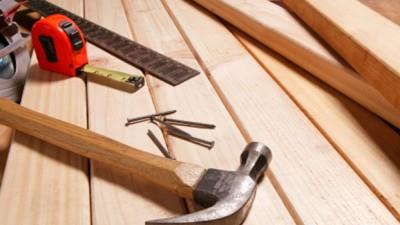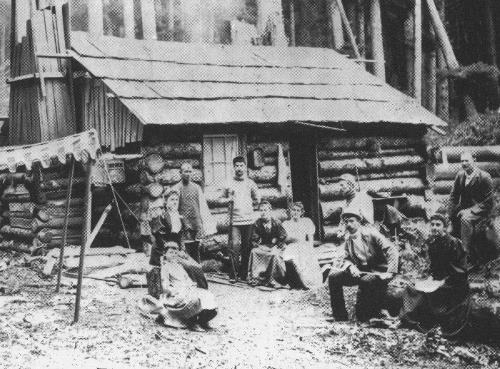Our modern society is highly dependent upon the “system.” Not only do we rely upon utility services to bring us electricity, water and natural gas, but also on an incredibly complex supply chain which provides us with everything from food to computers. Without that supply chain, most of us wouldn’t know what to do.
This situation is actually becoming worse, rather than better. When I compare my generation (I’m in my 50s) to that of my children, I see some striking differences. In my generation it was normal for a boy to grow up learning how to do a wide variety of trade skills from his father, and seemingly everyone knew how to do basic carpentry and mechanic work. But that’s no longer normal.
If we extrapolate it back, we can see that my father’s generation knew even more – and my grandparent’s generation even more. Those older generations were much more closely tied to the roots of an agricultural society, where people were self-reliant. There are multiple skills they had which modern society no longer considers necessary.
But if we were to have a breakdown in society, those skills which we never bothered to learn would become essential. Those who don’t know these skills would either have to learn or die trying.
Here are 8 skills our grandparents knew that most of us have long forgotten:
1. Gardening for Food
During World War II, there was a campaign for people to plant “Victory Gardens” at their homes. These vegetable gardens were needed to alleviate food shortages, because so much of the nation’s produce was being sent overseas to keep our troops and those of our allies fighting. With fewer men available to work the farms, there was less produce available.
This custom of having a vegetable garden in one’s backyard survived for many years after the war was over, but it gradually died out. Today, when many people think of gardening, they are thinking of a flower garden. While those are nice to look at, they don’t give you much to eat.
Starting and growing a vegetable garden can be harder than most people think. When I started gardening, it took me three years to get more than just herbs and a smattering of produce out of it. I’m glad I didn’t wait until I needed that garden for survival.
2. Animal Husbandry
Although the industrial revolution took place more than 100 years ago, many people continued to raise at least a small amount of their own livestock at home. This led to cities enacting ordinances limiting what animals people could keep within city limits.
Raising dogs and cats is much different than raising chickens and cows for their milk and cheese. A large part of being able to raise these animals is recognizing their needs and being able to diagnose their sicknesses. Farmers don’t depend upon the vet for most illnesses; they take care of it themselves.
3. Food Preservation
It’s rare to find people who preserve their own foods, but in our grandparent’s generation, it was common. Canning food, the process of taking tomatoes for example and storing them in a jar for later use, without them rotting away. Today, it’s rare to find people who know these methods of food preservation, let alone having the equipment needed. If we go back very far in American life, pretty much every middle class home had knowledge about various plants and vegetables, and how to dry them for the cold seasons ahead.
4. Blacksmithing
You might think that blacksmithing goes all the way back to the Old West, but in actuality it is a skill that stayed around much longer than that. My dad was a blacksmith in his later years, although most of the work he did was ornamental….
I remember traveling in Mexico about 20 years ago and having a spring on my car’s suspension break. A local blacksmith fashioned me a new spring, tempered and shaped exactly right for my vehicle. Blacksmiths can make or repair just about anything out of metal. Yet few today know this valuable skill.
Maybe we don’t need blacksmiths today, but if an EMP hit the country and we were without electrical power, the skills of a blacksmith would allow people to have their tools repaired — and new ones fashioned. Since the manufacturing plants presumably would be shut down, that ability would be essential for rebuilding America.
5. Basic Carpentry
Everyone should know how to make basic repairs to their home. Without the ability to repair damage from a natural disaster, it might not be possible to use the home as a survival shelter. Woodworking skills also allow one to make furniture and other items to help survive. That might include the use of or making of a home sawmill to cut up wood.
to repair damage from a natural disaster, it might not be possible to use the home as a survival shelter. Woodworking skills also allow one to make furniture and other items to help survive. That might include the use of or making of a home sawmill to cut up wood.
6. Basic Mechanical Repair
Depending upon the type of disaster that hits, the family car may just end up being a large paperweight. But there are many survival scenarios where it would be useful to be able to fix your car, keeping it running for general use. As long as there is gasoline, that car would be useful.
The ability to diagnose and repair an engine is useful not only for keeping a car on the road, but also for fixing lawn mowers, chain saws and other power tools.
7. Herbal Medicine
The roots of medicine were herbal medicine. While doctors have existed for millennia, it hasn’t been until recent times that those doctors had such a wide range of pharmaceuticals to work with. Before that, doctors made their own medicines.
Many women also learned to use what nature provided for medicine. It was not uncommon a few generations back for mom to take care of her family’s medical needs, using recipes that she had learned from her mother. Today, that sort of medicine is called “old wives’ tales” but it works just as well as it always did.
8. Horseback Riding
This may not seem like much of a survival skill, but in the Old West, stealing a man’s horse was a hanging offense. That’s because being stranded without a horse was generally a death sentence. While horseback riding today is only done for sport, if the automobile becomes no longer usable, people will be looking for horses once again.
Riding a horse is actually more complicated than the movies make it appear. Breaking a horse is a skill that few know. Likewise, there are few today, outside of the drivers for the Budweiser Clydesdales, who know how to hitch and drive a team of horses. But in America’s past, our ancestors drove teams with as many as 40 horse or mules in them.
Here’s A Beautiful Video Of A Couple Who Are In Touch With Their Surroundings:
Saving our forefathers ways starts with people like you and me actually relearning these skills and putting them to use to live better lives through good times and bad. Our answers on these lost skills comes straight from the source, from old forgotten classic books written by past generations, and from first hand witness accounts from the past few hundred years. Aside from a precious few who have gone out of their way to learn basic survival skills, most of us today would be utterly hopeless if we were plopped in the middle of a forest or jungle and suddenly forced to fend for ourselves using only the resources around us. To our ancient ancestors, we’d appear as helpless as babies.
In short, our forefathers lived more simply than most people today are willing to live and that is why they survived with no grocery store, no cheap oil, no cars, no electricity, and no running water. Just like our forefathers used to do, The Lost Ways Book teaches you how you can survive in the worst-case scenario with the minimum resources available. It comes as a step-by-step guide accompanied by pictures and teaches you how to use basic ingredients to make super-food for your loved ones.
___________________________________________________________________________
WHAT TO READ NEXT:
OLD SCHOOL HOMEMADE DRY CURED AND AIR DRIED BACON
20 LOST RECIPES FROM THE PIONEERS: WHAT THEY COOKED IN THEIR JOURNEY WESTWARD
SEVEN CLASSIC GREAT DEPRESSION ERA RECIPES GRANDMA USED TO MAKE
POTTED MEAT: A LOST SKILL OF LONG TERM MEAT STORAGE
BACK TO BASICS: HOW TO MAKE AND PRESERVE LARD
THE BEST WAY TO STOCKPILE VEGETABLES OFF-GRID
OLD FASHIONED PRESERVING-GRANDPA’S RECIPE FOR CURED SMOKED HAM
HOW TO MAKE GUNPOWDER THE OLD FASHIONED WAY
SURVIVAL HERBAL RECIPES FROM OUR ANCESTORS
___________________________________________________________________
OTHER USEFUL RESOURCES!
Blackout USA (EMP survival and preparedness guide)
Bullet Proof Home (A Prepper’s Guide in Safeguarding a Home )
Backyard Innovator (All Year Round Source Of Fresh Meat,Vegetables And Clean Drinking Water)
Conquering the coming collapse (Financial advice and preparedness )
Liberty Generator (Easy DIY to build your own off-grid free energy device)
Backyard Liberty (Easy and cheap DIY Aquaponic system to grow your organic and living food bank)
Family Self Defense (Best Self Defense Strategies For You And Your Family)
Sold Out After Crisis (Best 37 Items To Hoard For A Long Term Crisis)
US Water Revolution (Generate Your Clean Water Anywhere)
Alive After The Fall (Key Survival Situation Procedures and Knowledge )
Mega Drought USA:(Discover The Amazing Device That Turns Air Into Water)
Survive The End Days (Biggest Cover Up Of Our President)
Survival MD (Best Post SHTF Medical Survival Guide Ever)
Source: idealistrevolution.org



